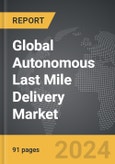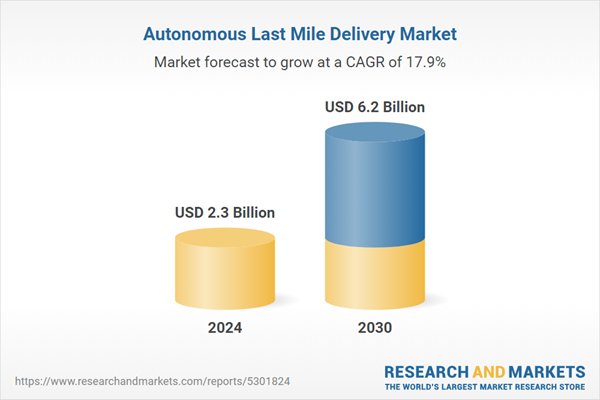Global Autonomous Last Mile Delivery Market - Key Trends and Drivers Summarized
What Is Autonomous Last-Mile Delivery, and Why Is It Transforming Logistics?
Autonomous last-mile delivery, which involves the use of self-driving vehicles, drones, and robots to transport goods from distribution centers to the final destination, is fundamentally reshaping the logistics and e-commerce landscape. But what makes this technology so groundbreaking? Traditionally, the “last mile” of delivery - the final step that brings goods to consumers' doorsteps - is notoriously complex and costly, accounting for up to half of overall logistics expenses due to labor, fuel costs, and the inherent inefficiencies of navigating densely populated areas. Autonomous delivery solutions aim to alleviate these challenges by removing the dependency on human drivers, thereby reducing labor costs, optimizing fuel use, and enabling delivery systems to operate continuously. These systems employ an array of advanced sensors, AI-driven navigation algorithms, and obstacle-avoidance technologies to safely and efficiently navigate through urban and suburban environments, reaching homes, lockers, or designated drop-off points without human intervention. With the rise of e-commerce and increasing consumer expectations for rapid, reliable delivery, autonomous last-mile delivery technology is poised to enhance delivery speed, convenience, and sustainability. It also helps reduce carbon emissions, as autonomous electric-powered vehicles consume less energy, ultimately contributing to environmentally conscious logistics solutions. This technology promises to redefine the delivery landscape, setting new standards for how goods are transported in the age of digital commerce.How Are Autonomous Last-Mile Delivery Solutions Being Used Across Industries?
Autonomous last-mile delivery solutions are gaining traction across multiple sectors, each leveraging this technology to address unique logistics needs and enhance operational efficiency. In e-commerce and retail, companies are adopting autonomous vehicles and delivery robots to provide faster, more cost-effective delivery options, particularly for small packages and groceries within congested urban areas. Large retail chains and online marketplaces have partnered with technology firms to deploy self-driving delivery vehicles that can transport products directly to consumers, even during high-demand periods, without the added burden of labor costs and scheduling limitations. The food and beverage industry has also embraced autonomous delivery solutions to expedite the distribution of fresh meals and beverages, especially in dense environments like business districts and university campuses, where quick, contactless delivery is in high demand. In the healthcare sector, autonomous delivery is emerging as a critical solution for transporting medical supplies, lab samples, and even prescription medications to patients, allowing healthcare providers to quickly and reliably deliver essential items to remote or underserved areas. This technology is especially transformative in rural and hard-to-reach locations, where access to timely healthcare products can be a matter of public health.What Challenges Does Autonomous Last-Mile Delivery Face in Becoming Widely Adopted?
While autonomous last-mile delivery offers promising benefits, several challenges stand in the way of its widespread adoption. One of the primary technical challenges is navigating the complexities of urban environments, especially those with heavy pedestrian traffic, varying road conditions, and dense infrastructure. Autonomous delivery vehicles and drones must be capable of precisely detecting and avoiding obstacles such as people, animals, and other vehicles, as well as handling weather-related complications like rain, snow, or fog that can obscure visibility and interfere with GPS signals. Ensuring the safety and reliability of autonomous systems in these conditions is critical, as any failure could pose risks to public safety and damage trust in the technology. Regulatory hurdles also play a significant role in limiting deployment, as autonomous delivery robots and drones are subject to diverse laws and standards across countries, states, and municipalities. These regulations often cover aspects such as flight paths, speed limits, data security, and operational hours, making it difficult to develop a standardized approach for deploying autonomous delivery solutions on a large scale. Security is another major concern, given that autonomous systems collect and transmit significant amounts of data, including location and usage information, which could be vulnerable to cyber-attacks. Gaining public trust and acceptance is equally important; consumers must feel confident in the safety, reliability, and privacy of autonomous delivery options for them to become a mainstream solution.What Are the Key Growth Drivers of the Autonomous Last-Mile Delivery Market?
The growth of the autonomous last-mile delivery market is being driven by several key factors, including advancements in AI, rising e-commerce demand, and a heightened focus on sustainable, efficient delivery solutions. One of the most significant drivers is the progress in AI and machine learning, which has enabled autonomous vehicles to navigate complex environments, avoid obstacles, and make real-time decisions. As these AI capabilities continue to mature, autonomous delivery solutions are becoming increasingly reliable and safe, paving the way for more complex and widespread applications. The rapid expansion of e-commerce has also intensified the demand for faster, more cost-effective delivery solutions, as companies strive to meet consumer expectations for rapid delivery while managing costs. Autonomous delivery technologies offer a way to achieve these goals by operating around the clock without the labor constraints that come with human drivers. In addition, environmental considerations are fueling the adoption of autonomous last-mile delivery systems. Cities around the world face challenges such as congestion and pollution, and companies are under pressure to meet ambitious sustainability targets. Autonomous last-mile delivery offers an eco-friendly alternative to conventional delivery methods, as electric-powered drones, robots, and vehicles produce fewer emissions and reduce the need for fuel. The COVID-19 pandemic further highlighted the need for contactless delivery solutions, boosting demand for autonomous systems that can minimize human contact and enhance public safety. As these trends converge - advances in technology, consumer demand for fast delivery, environmental awareness, and health concerns - the autonomous last-mile delivery market is positioned for substantial growth, becoming an essential component in the future of logistics and urban transportation.Report Scope
The report analyzes the Autonomous Last Mile Delivery market, presented in terms of market value (US$ Thousand). The analysis covers the key segments and geographic regions outlined below.- Segments: Platform (Ground Delivery Vehicles, Aerial Delivery Drones); Range (Short Range, Long Range); End-Use (Logistics & Transportation, Food & Retail, Healthcare & Pharmaceutical).
- Geographic Regions/Countries:World; United States; Canada; Japan; China; Europe (France; Germany; Italy; United Kingdom; and Rest of Europe); Asia-Pacific; Rest of World.
Key Insights:
- Market Growth: Understand the significant growth trajectory of the Ground Delivery Vehicles segment, which is expected to reach US$4.2 Billion by 2030 with a CAGR of a 17.3%. The Aerial Delivery Drones segment is also set to grow at 19.2% CAGR over the analysis period.
- Regional Analysis: Gain insights into the U.S. market, valued at $660.3 Million in 2024, and China, forecasted to grow at an impressive 17.5% CAGR to reach $969.3 Million by 2030. Discover growth trends in other key regions, including Japan, Canada, Germany, and the Asia-Pacific.
Why You Should Buy This Report:
- Detailed Market Analysis: Access a thorough analysis of the Global Autonomous Last Mile Delivery Market, covering all major geographic regions and market segments.
- Competitive Insights: Get an overview of the competitive landscape, including the market presence of major players across different geographies.
- Future Trends and Drivers: Understand the key trends and drivers shaping the future of the Global Autonomous Last Mile Delivery Market.
- Actionable Insights: Benefit from actionable insights that can help you identify new revenue opportunities and make strategic business decisions.
Key Questions Answered:
- How is the Global Autonomous Last Mile Delivery Market expected to evolve by 2030?
- What are the main drivers and restraints affecting the market?
- Which market segments will grow the most over the forecast period?
- How will market shares for different regions and segments change by 2030?
- Who are the leading players in the market, and what are their prospects?
Report Features:
- Comprehensive Market Data: Independent analysis of annual sales and market forecasts in US$ Million from 2024 to 2030.
- In-Depth Regional Analysis: Detailed insights into key markets, including the U.S., China, Japan, Canada, Europe, Asia-Pacific, Latin America, Middle East, and Africa.
- Company Profiles: Coverage of players such as Airbus, Altitude Angel, Cheetah Logistic Technology, Drone Delivery Canada, Dronescan and more.
- Complimentary Updates: Receive free report updates for one year to keep you informed of the latest market developments.
Some of the 38 companies featured in this Autonomous Last Mile Delivery market report include:
- Airbus
- Altitude Angel
- Cheetah Logistic Technology
- Drone Delivery Canada
- Dronescan
- Edronic
- Flirtey
- Flytrex
- Hardis Group
- Matternet
This edition integrates the latest global trade and economic shifts into comprehensive market analysis. Key updates include:
- Tariff and Trade Impact: Insights into global tariff negotiations across 180+ countries, with analysis of supply chain turbulence, sourcing disruptions, and geographic realignment. Special focus on 2025 as a pivotal year for trade tensions, including updated perspectives on the Trump-era tariffs.
- Adjusted Forecasts and Analytics: Revised global and regional market forecasts through 2030, incorporating tariff effects, economic uncertainty, and structural changes in globalization. Includes historical analysis from 2015 to 2023.
- Strategic Market Dynamics: Evaluation of revised market prospects, regional outlooks, and key economic indicators such as population and urbanization trends.
- Innovation & Technology Trends: Latest developments in product and process innovation, emerging technologies, and key industry drivers shaping the competitive landscape.
- Competitive Intelligence: Updated global market share estimates for 2025, competitive positioning of major players (Strong/Active/Niche/Trivial), and refined focus on leading global brands and core players.
- Expert Insight & Commentary: Strategic analysis from economists, trade experts, and domain specialists to contextualize market shifts and identify emerging opportunities.
Table of Contents
Companies Mentioned (Partial List)
A selection of companies mentioned in this report includes, but is not limited to:
- Airbus
- Altitude Angel
- Cheetah Logistic Technology
- Drone Delivery Canada
- Dronescan
- Edronic
- Flirtey
- Flytrex
- Hardis Group
- Matternet
Table Information
| Report Attribute | Details |
|---|---|
| No. of Pages | 166 |
| Published | January 2026 |
| Forecast Period | 2024 - 2030 |
| Estimated Market Value ( USD | $ 2.3 Billion |
| Forecasted Market Value ( USD | $ 6.2 Billion |
| Compound Annual Growth Rate | 17.9% |
| Regions Covered | Global |









